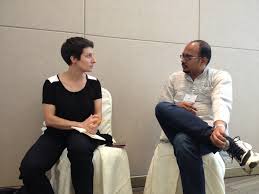How We Work
Listeners Without Borders offers tools for developing emotional intelligence, good leadership and good collaboration. We turn to aid workers, activists, and politically and socially engaged individuals. We work in both developed and developing countries.
Our organization
We are a non-profit democratic association that is not affiliated with any party or religion.
Feel free to read our bylaws .
To listen and be listened to
Our tools are designed for both individuals and groups who have decided to improve living conditions here on earth. listened to by people around you. You learn to talk to each other in a very caring and empowering way.
It’s about more than just passively listening. As we become confident with the method and each other, we learn to begin to challenge each other in powerful and caring ways.
Our methods are proven and give fantastic results for both private individuals and work colleagues.
Together we meet each other by actively listening to each other and working for a humane world!
A fair and humane world - we know it is possible!
We start from the assumption that all people are basically cooperative and good. It’s not about being naive. People do things that are not intelligent or good. But we have discovered that if we assume that in every human being there is a core of humility and goodness, then each individual becomes more exciting and interesting to be with. We have also seen that when we humans are given the opportunity to have processing conversations, we begin to act more rationally, cooperatively and “well”.
Relationships and behavior patterns
Against the background of this basic assumption, it is natural for a person to have good relationships with others, to think well, to act wisely and successfully and to enjoy life.
Every human being cooperates and acts on the basis of this basic idea, always wise, except when rigid thought and behavior patterns that stem from emotional blockages get in the way.
Our flexible and smart thinking and behavior is then replaced by irrational actions, negative emotions, failed cooperation or failed communication. These rigid patterns are remnants of physically or emotionally painful experiences, many of them from childhood, from which we never fully recovered. The patterns are activated when something in the current situation reminds us of previous occasions when we have been bad.
The lingering effects of painful experiences can be eliminated through natural emotional experiences (such as crying, laughing, yawning, and trembling). After such an emotional experience, a person is able to think more clearly and to re-evaluate what happened when she previously felt bad.
Part of social education teaches us not to live out emotions. It happens through messages like “Do not cry”, “Be a big boy” and so on. These messages prevent release from our blockages, and lead to an increasing set of rigid patterns and tensions. As we grow older, this has severely limited our initial ability to have good relationships with others, to succeed, and to enjoy life. It also hinders our progress towards a society that supports all people to flourish in collaborative, respectful relationships.
The natural ability to recover from patterns and difficulties is a very important part of constructive conversations. The first condition is a listener, helper, who is sincerely interested, who remains relaxed in the face of our emotional experiences and understands how the process of discharging emotions works.
Oppression
Many of our patterns and blockages are the result of structurally imposed rigidities that we call oppression (racism and sexism, for example). Every adult in all existing societies has been brought up through rigid patterns to function in roles as both oppressed and oppressor. (For example, the same person may be both oppressed by racism and in the role of oppressor when it comes to the oppression of women.)
Oppression is not inevitable, not innate in us humans. Oppression arises and operates only due to rigid patterns. No human being would agree to submit to oppression if a pattern of such submission had not previously taken place in connection with the individual’s previous harm.
Nor would any human being ever agree to or contribute to the oppression of another human being unless a rigid pattern had previously been established. Once these patterns are in place, we are easily influenced to act irrationally and oppressively towards others. We even humiliate and oppress ourselves and people from our own group when we have been subjected to oppressive messages so much that we have incorporated them.
Constructive conversations
is a method of freeing people from rigid patterns and thus regaining a completely intelligent way of functioning. Combined with structural changes, they also help to liberate society as a whole from rigid patterns and oppressive structures.
 Constructive conversations are performed by two or more individuals taking turns listening to each other and helping each other to free themselves from patterns and painful emotional tensions.
Constructive conversations are performed by two or more individuals taking turns listening to each other and helping each other to free themselves from patterns and painful emotional tensions.
Due to the fact that no financial compensation is exchanged between those who give each other attention in these conversations, anyone can, regardless of their financial situation, use constructive conversations. Similar conversational methods have been used to eliminate racism since the 1970s.
Theme meeting
Within Listeners Without Borders , people participate in theme meetings and courses where they exchange talk time to free themselves from the influence of racism. Our theme meetings and courses are aimed at all kinds of people with different backgrounds.
Questions?
Feel free to contact us if you need to ask a question or for clarification
Contact usOur Vision
A fair and humane world, which is possible with the help of our conversation tools and leadership training.
Learn More